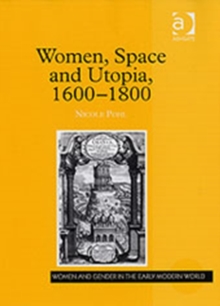Description
| Product ID: | 9780754652571 |
| Product Form: | Hardback |
| Country of Manufacture: | GB |
| Series: | Women and Gender in the Early Modern World |
| Title: | Women, Space and Utopia 1600–1800 |
| Authors: | Author: Nicole Pohl |
| Page Count: | 208 |
| Subjects: | Literary studies: general, Literary studies: c 1500 to c 1800, Gender studies: women and girls, Gender studies: women, English |
| Description: | Select Guide Rating A study of women's utopian spatial imagination in the 17th and 18th centuries, this book explores the correlation between identity and social space. The investigation is driven by conceptual questions, and seeks to link theoretical debates about space, gender and utopianism to historiographic debates about the social production of space. The first full length study of women''s utopian spatial imagination in the seventeenth and eigtheenth centuries, this book explores the sophisticated correlation between identity and social space. The investigation is mainly driven by conceptual questions and thus seeks to link theoretical debates about space, gender and utopianism to historiographic debates about the (gendered) social production of space. As Pohl''s primary aim is to demonstrate how women writers explore the complex (gender) politics of space, specific attention is given to spaces that feature widely in contemporary utopian imagination: Arcadia, the palace, the convent, the harem and the country house. The early modern writers Lady Mary Wroth and Margaret Cavendish seek to recreate Paradise in their versions of Eden and Jerusalem; the one yearns for Arcadia, the other for Solomon''s Temple. Margaret Cavendish and Mary Astell redefine the convent as an emancipatory space, dismissing its symbolic meaning as a confining and surveilled architecture. The utopia of the country house in the work of Delarivier Manley, Sarah Scott and Mary Hamilton will reveal how women writers resignify the traditional metonym of the country estate. The study will finish with an investigation of Oriental tales and travel writing by Ellis Cornelia Knight, Lady Mary Montagu, Elizabeth Craven and Lady Hester Stanhope who unveil the seraglio as a location for a Western, specifically masculine discourse on Orientalism, despotism and female sexuality and offers their own utopian judgment. |
| Imprint Name: | Routledge |
| Publisher Name: | Taylor & Francis Ltd |
| Country of Publication: | GB |
| Publishing Date: | 2006-01-05 |


